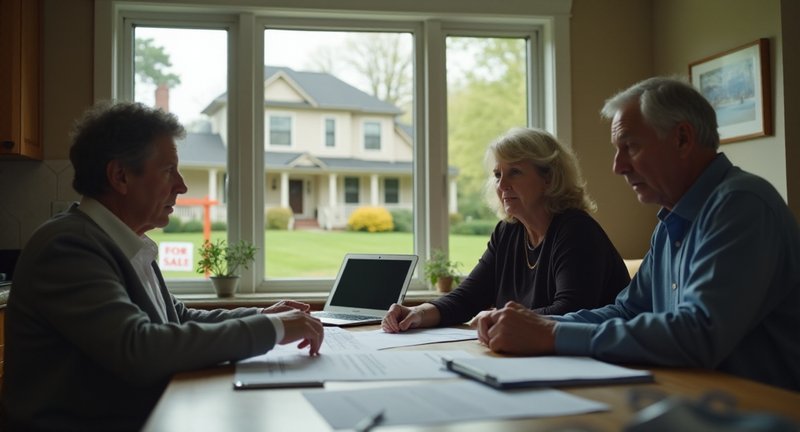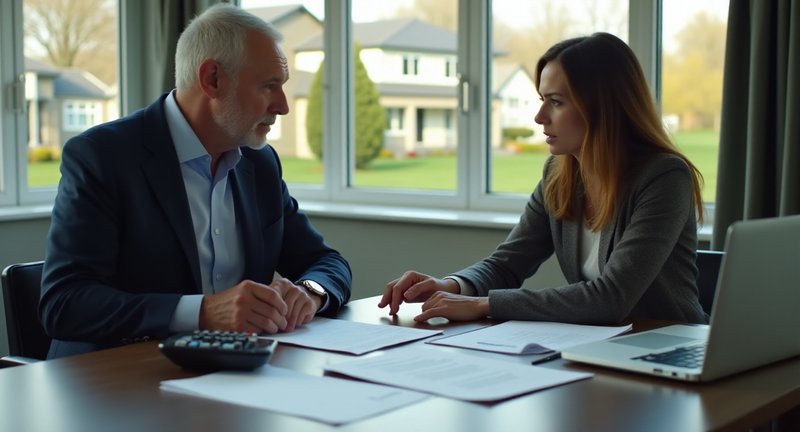How Do You Buy Someone Out of a House
Buying someone out of a house can feel like untangling a knot especially if emotions are involved. But, if you’re prepared and strategic, the process can be smooth. Let’s walk through how this works, shall we?
First, you’ll need to figure out the value of the house. An appraisal by a licensed professional is the best way to go here. This gives you a fair and objective starting point.
Next, determine the equity. The person you’re buying out is entitled to their share of the home’s equity. For example, if the home is worth $400,000 and the remaining mortgage is $100,000, the equity is $300,000. If you’re splitting it 50/50, your partner’s share is $150,000.

So, how do you buy someone out of a house in practical terms? Here’s the blueprint:
- Refinance the mortgage: You’ll need to qualify for a mortgage on your own, which might mean a credit check and income verification. Once approved, the new loan will pay off the old one, and your partner walks away with their agreed-upon share.
- Cash them out: If you have savings, you could pay them their share upfront without refinancing. Simple but not always feasible.
- Use an installment plan: This might be a good option if you can’t raise the full amount right away. You and the other person agree on a schedule to pay them off over time.
Remember, all this should be backed up by legal documentation. Buying someone out isn’t just a handshake deal.
From my own experience, patience and clear communication are your best friends during this process. It’s not just about the numbers it’s about making sure both parties walk away feeling respected.
The Importance of How Do You Buy Someone Out of a House
When it comes to parting ways with a shared property, things can get a bit tricky. The process of one party stepping away and another taking over the full ownership can feel like walking through a minefield, especially if emotions are involved. But don’t worry there’s always a way to make the transition smooth if you approach it with the right mindset.
The first thing that usually comes to mind is finances. Can you or the other person truly afford to go it alone? It’s not just about covering the mortgage; it’s about knowing your numbers down to the smallest details. This isn’t a decision to make on the fly, trust me.

Then, you’ve got the legal side. There’s paperwork always. But the key is getting those agreements in writing before things get messy. You’d be surprised how much of this process hinges on communication and clarity. It’s not glamorous, but it’s necessary.
One thing I’ve learned is to expect surprises. The process isn’t just about dollars and documents it’s about expectations. If you can keep calm and approach it practically, you’ll come out the other side in one piece, with your sanity intact. Let’s face it: this is as much a financial move as it is an emotional one.
Understanding the Basics of Buying Out a Co-Owner
Considering buying out a co-owner, things can get a bit more complex than they seem at first glance. I’ve walked through this process myself and let me tell you it’s not just about handing over some money and signing a piece of paper. It’s a balancing act of finances, negotiations, and even a bit of emotional navigation.
First, you need a solid understanding of the property’s current market value. This is your starting point. Often, people skip this step, and it leads to all sorts of issues later on. I always recommend bringing in a third-party appraiser. That way, there’s no room for bias.
Next, you’ll have to figure out the financial logistics:
- Calculate the co-owner’s share: If they own 50%, you’re on the hook for buying out that percentage of the home’s value.
- Consider existing debts: Are there mortgages or loans tied to the property? These could affect how much you owe.
- Financing the buyout: Are you paying cash, or will you need a loan? Be prepared to demonstrate your ability to finance the buyout to the co-owner and any relevant financial institutions.
Then comes the actual negotiation phase. This is where things can get delicate. I’ve seen co-owners who were ready to go at each other’s throats. To avoid tension, keep the conversation professional. Make sure both parties are clear about expectations, timelines, and legal steps involved.
Also, don’t forget about paperwork. Lawyers and real estate professionals will play a key role in drawing up the final agreements. It’s worth the investment to get everything squared away legally.
Steps to Buy Out a Partner’s Share of a Property
Buying out a partner’s share in a property isn’t as simple as it sounds, but it’s definitely doable. The first step is to get a valuation of the property, and trust me, getting an accurate one is key. You don’t want any surprises down the road.
Once you have the value, it’s time to have an open and honest conversation with your partner. You need to agree on the amount they’re willing to accept. I’ve seen negotiations take a while, so be patient.
After you both agree, it’s crucial to secure financing. This can mean either using your own funds or applying for a mortgage, depending on your situation. But remember, banks don’t just hand out loans you’ll need to prove you can handle the additional financial responsibility.
With the financing sorted, you’ll need to get the legal side squared away. Engaging a solicitor to draft the necessary documents ensures the transfer is smooth and officially recognized. Believe me, skipping legal advice can cause headaches later on.
Also, once everything is signed, sealed, and delivered, you’re free to celebrate. Just don’t forget being the sole owner comes with a lot more responsibility, so be ready to manage it all on your own.
Valuing the Property Before the Buyout
Valuing a property before a buyout is like pulling back the curtain to get a clear picture of what you’re truly working with. It’s tempting to rush this part, but trust me, slowing down here will save you headaches later. In my own experience, it’s crucial to take a few essential steps to determine the value accurately.
First off, let’s break it down into some manageable pieces:
-
Market Value Estimate: The obvious place to start is with a professional appraisal. An appraiser gives you a clear idea of the current market value of the property. This isn’t just a ballpark figure it’s based on real data from similar homes in the area and is the most objective measure you’ll get.
-
Comparative Market Analysis (CMA): Think of this as the DIY version of an appraisal, but don’t let the ‘DIY’ part fool you. A realtor can provide a CMA, showing recent sales in the neighborhood. It’s less formal than an appraisal, but still very useful, especially if you’re considering multiple perspectives.
-
Outstanding Liabilities: Don’t forget that the property’s worth isn’t just what it would sell for. What’s still owed on the mortgage? Are there any liens? Make sure to subtract these to get a clear net value. You don’t want to be blindsided by hidden costs that might lower the real value of the asset.
Once you’ve got these pieces in place, it’s time to talk numbers. Open communication is key. From my experience, keeping a healthy dialogue between both parties can ensure that no one feels shortchanged or blindsided.
Now, you might think it’s all about numbers, but emotions often get tangled in these discussions, especially if the property holds sentimental value. A balanced, professional approach helps to keep those emotions from skewing the real valuation.
How to Determine Equity When Buying Out a House
Determining equity when buying out a house isn’t just about crunching numbers it’s about understanding the bigger picture. The first thing I learned when I went through this process myself is that you need to assess the current market value of the property. It’s surprising how different that can be from what you originally paid.
Next, take a good look at how much is still owed on the mortgage. Subtract that from the home’s value, and there you have it the raw equity. But it’s never quite that simple, is it? If you’ve invested in upgrades, repairs, or maintenance, those things add value too, and they should absolutely be considered in your equity calculations.
Once you have the equity amount, you’ll need to divide it fairly, which often depends on how much each party has contributed over the years. And if you’ve been the one carrying more of the financial burden, well, that needs to be reflected in the final number.
One thing that people forget? Fees. There are always legal fees, appraisal costs, and sometimes even taxes that need to be considered before the final payout is determined. Those little details can make a significant difference when it comes to settling on a figure.
In my experience, it’s a delicate process, and it’s always better to get professional advice. No one wants to leave money on the table, but you also want to keep things fair and amicable. At the end of the day, it’s all about walking away with peace of mind, knowing you’ve made a fair deal.
Negotiating a Fair Price for a Property Buyout
When discussing negotiating a fair price for a property buyout, emotions often run high. The key here is to stay calm and clear-headed, as letting your feelings take over can easily cloud your judgment. I’ve found that understanding the property’s true value is the best foundation to start from. Trust me, having an accurate appraisal in hand can be your best friend in these situations.
You’ll also want to consider more than just the market value. Factor in the costs of any repairs, renovations, or even sentimental value that might influence the final price. This is not just a numbers game – it’s about striking a balance between logic and fairness.
In my experience, transparency is critical. Both parties should feel they’re getting a fair deal, and that only happens when you’re upfront about what you’re looking for. Open conversations about expectations help prevent misunderstandings that could derail the process.
Sometimes, you need to be flexible in negotiations. I’ve seen situations where one party is set on a certain price, but a creative solution – like staggered payments or taking on additional costs – helps seal the deal.
Above all, patience is key. I’ve been through buyout negotiations that seemed to drag on forever, but waiting for the right moment, instead of rushing to close, often leads to the best outcomes. So, take your time and approach the table with confidence and clarity.
Financing Options for Buying Out a House Co-Owner
Navigating the labyrinth of financing when it comes to acquiring a co-owner’s stake in a property can feel like a daunting expedition. Trust me, I’ve been there, and it’s all about finding the right path that fits your unique situation.
One of the most common avenues to explore is refinancing the mortgage. This option allows you to take over the entire loan under your name, effectively freeing the co-owner from their financial obligations. You might feel the weight lift off your shoulders, knowing you’re the sole captain of this ship now.
Then there’s the intriguing world of personal loans. If refinancing doesn’t seem feasible, a personal loan might just be your trusty sidekick. It can provide the necessary funds to buy out the other party without getting tangled in the complexities of your existing mortgage.
You could also consider leveraging your savings or even tapping into retirement accounts. While it might feel a bit unconventional, using personal savings could be a wise way to avoid additional debt. However, this move requires careful thought about future financial security.
Don’t overlook the power of negotiating with your co-owner. Sometimes, a mutually beneficial arrangement can save you both from financial strain. Open communication can lead to creative solutions that might not have crossed your mind initially.
Also, choosing the right financing option depends on your financial landscape and long-term goals. Take a moment to assess what suits you best, and don’t hesitate to seek professional advice if the path seems unclear.
How to Refinance a Mortgage for a House Buyout
Refinancing a mortgage for a house buyout can feel like navigating a labyrinth of paperwork and numbers, but trust me, it’s doable! I remember when I was faced with a similar situation, and the prospect seemed daunting. Here’s a roadmap to guide you through the process.
1. Assess Your Financial Landscape
Before diving in, take stock of your finances. Consider the following:
- Current income and expenses
- Credit score and history
- Existing debt obligations
- Future financial goals
2. Understand Your Mortgage Options
Not all refinancing options are created equal. Familiarize yourself with these common choices:
- Rate-and-Term Refinance: Adjusting your interest rate or term without cashing out equity.
- Cash-Out Refinance: Accessing your home equity for the buyout, providing you with the funds needed.
- Streamline Refinance: Simplified process, often with less documentation, ideal for lower rates.
3. Gather Necessary Documentation
Prepare to showcase your financial stability. You’ll likely need:
- Proof of income (pay stubs, tax returns)
- Bank statements
- Information about the existing mortgage
- Details of the buyout agreement
4. Shop Around for Lenders
Don’t settle for the first offer. Explore various lenders to find the best deal. Look for:
- Competitive interest rates
- Favorable terms and conditions
- Low closing costs
5. Close the Deal
Once you’ve selected a lender, it’s time to finalize the process. Expect to:
- Review closing disclosures
- Sign the final paperwork
- Pay any associated fees
Remember, every situation is unique, so tailor these steps to fit your personal circumstances. With the right preparation and a little patience, you’ll emerge on the other side with a mortgage that suits your new reality.
Legal Considerations When Buying Someone Out of a House
When you’re considering buying someone out of a house, the process is a bit more involved than simply writing a check and handing over the keys. Trust me, I’ve been there. It’s important to approach this with a solid understanding of the legal landscape to avoid pitfalls down the road. The first question many people ask is, ‘How do you buy someone out of a house?’ Well, let’s break it down.
-
Legal Documentation: The ownership structure of the house is key. Are you joint tenants or tenants in common? Each situation comes with different legal ramifications when one party wants out. It’s essential to check the title and understand the rights attached to it. If you’re unsure, consulting a real estate attorney is a good step.
-
Valuation of the Property: You can’t just guess the value of the house. Both parties should agree on an appraisal by a professional. This is your baseline for the buyout price.
-
Financing the Buyout: Do you have the cash on hand to buy out the other person? If not, you might need to refinance the mortgage or take out a loan. Remember, the lender will scrutinize your financial health, so be ready for that process.
-
Legal Transfer: Once you’ve agreed on the price and financing, you’ll need a formal agreement to transfer ownership. This includes signing a quitclaim deed, which transfers the interest in the property to you. This isn’t something to DIY make sure it’s all legally sound.
In my experience, staying organized and keeping emotions in check is critical. It’s a business transaction, but because it involves a home, emotions can run high.
Tax Implications of a Property Buyout
Buying out a property can feel like navigating a maze of financial decisions. The tax implications? They’re one of the trickiest parts to untangle, and trust me, I’ve been down that road.
When one party takes over a property, the transaction is often treated like a sale for tax purposes. The buyer might be facing stamp duty or transfer taxes, while the seller could be hit with capital gains. I remember thinking, ‘Isn’t this just a switch of ownership?’ Turns out, the tax authorities don’t see it that way.
If there’s a mortgage involved, things get even murkier. You’re not just taking on someone’s equity; you’re assuming their debt. And yes, that comes with its own set of tax headaches. I learned the hard way that you’ll want to have an accountant in your corner.
It’s easy to overlook tax consequences in the heat of a buyout negotiation. But if there’s one thing I’d say from experience don’t. The taxes might not bite right away, but they’ll come calling when you least expect it. Plan ahead, and you’ll thank yourself later.
A Comprehensive Look at How Do You Buy Someone Out of a House
With respect to navigating the intricate dance of property ownership, the idea of acquiring someone’s share of a home can feel daunting. I remember the first time I ventured into this territory; it felt like stepping into a chess game where each move had significant consequences.
The first step is to have an open conversation. It’s essential to lay all cards on the table, discussing expectations and financial realities. This isn’t just a business transaction; it’s a personal journey that can impact relationships deeply.
Next, evaluating the home’s worth is crucial. I often relied on a professional appraisal to ensure we had an accurate picture of the property’s value. This figure becomes the foundation for negotiations and helps avoid emotional pricing.

Then comes the delicate balance of finances. If you’re like me, the thought of securing funds can be a head-scratcher. Exploring options such as personal loans, refinancing, or even seller financing can pave the way for a smoother transition.
Once both parties reach an agreement, paperwork becomes the necessary evil. Enlisting a real estate attorney can be a game-changer, ensuring that everything is above board and legally sound. After all, the last thing anyone wants is a future headache stemming from a poorly executed deal.
In the end, the process is not just about acquiring a share of a home but also about preserving relationships and ensuring that both parties feel respected. Approach it with care, and you’ll find the path smoother than you initially imagined.
Drafting a Buyout Agreement for a House
Creating a buyout agreement for a house is both an art and a science. It’s like balancing personal emotions with hard numbers, and let’s be honest few things in life are more complex than that.
The first step is always to nail down the property’s value. You’ll need a fair, third-party appraisal, but don’t get too attached to any single number. That figure is just the start of what might feel like a negotiation marathon.
Next comes deciding on the payout. This part is tricky. I’ve seen people assume the buyout is just half the value of the house. In reality, you’ve got to account for mortgages, equity, and any improvements made.
If you’re thinking of using a lawyer, I can’t recommend it enough. Not just to ensure the language is tight, but also to keep things from becoming overly personal. Trust me, a good lawyer can save you from future headaches, especially if something goes wrong with payments later.
Don’t forget to consider taxes. Buyouts might trigger tax implications, and no one likes that surprise. So, it’s wise to bring in an accountant at some point, just to make sure everything’s covered.
In the end, a solid buyout agreement doesn’t just protect the person leaving the house. It ensures both parties walk away with a clear understanding and hopefully, less drama.
The Role of a Real Estate Attorney in a Buyout
From my experience, navigating the buyout of property without a real estate attorney can feel like diving into unknown waters without a map. When the stakes are high, and money is on the table, the guidance of a seasoned real estate attorney becomes invaluable. They play multiple roles, from being a legal strategist to an adviser who protects your interests throughout the transaction.
Here’s where they shine:
-
Contractual Guidance: A buyout often involves complex legal documentation, and trust me, the fine print can either save or cost you thousands. An attorney ensures the agreement is bulletproof, leaving no room for surprises down the road.
-
Title Checks: It’s not just about exchanging cash. The attorney will dive into title checks to make sure there are no hidden claims, liens, or ownership disputes that could bite you later. This peace of mind is worth its weight in gold.
-
Negotiation Support: Sometimes, these transactions become emotionally charged, especially if family or long-term partners are involved. A real estate attorney acts as the cool-headed negotiator, keeping the process professional while making sure your interests stay in the spotlight.
-
Ensuring Compliance: There are always local laws, taxes, and regulations to keep in mind, which can feel like a maze. The attorney ensures every T is crossed and every I is dotted, preventing any legal setbacks.
Their expertise creates a seamless bridge between intention and completion. Having walked clients through countless buyouts, I can confidently say an experienced attorney doesn’t just assist – they empower you to make the smartest decisions.
How to Divide Assets and Liabilities in a Property Buyout
When embarking on a property buyout, one of the most delicate aspects to navigate is the division of assets and liabilities. From my experience, this process can feel like trying to untangle a knotted necklace frustrating, yet oddly satisfying once you get it right. Here are some insights that can guide you through this intricate dance:
-
Assess the Property’s Value:
- Get a professional appraisal to determine the fair market value of the property.
- Consider any recent renovations or market trends that could influence the price.
-
Identify Liabilities:
- List all outstanding mortgages or loans associated with the property.
- Don’t forget about property taxes, maintenance costs, and insurance premiums that may need settling.
-
Calculate Net Equity:
- Subtract total liabilities from the property’s value to get the net equity.
- This figure is crucial for determining how much each party is entitled to.
-
Negotiation:
- Open a dialogue about how to split the equity. It’s essential to approach this conversation with transparency and a willingness to compromise.
- Explore options like one party buying out the other’s share or considering alternative assets as compensation.
-
Document Everything:
- Ensure all agreements are documented legally. It protects both parties and prevents future misunderstandings.
Navigating the waters of a property buyout doesn’t have to be tumultuous. With clear communication and a structured approach, you can make the process smoother. Remember, this is more than just a financial transaction; it’s about preserving relationships and moving forward positively.
We’ve Got Answers
How do you work out how to buy someone out of a house?
To buy someone out of a house, you first need to determine the property’s current market value. You can either hire an appraiser or get a real estate agent’s opinion. Once you know the value, subtract any outstanding mortgage balance to find the home’s equity. Next, divide the equity between the owners based on ownership shares. You would then need to pay your co-owner their share of the equity to complete the buyout, effectively taking over full ownership of the house.
Is it expensive to buy someone out of a house?
The cost of buying someone out of a house depends on several factors, such as the value of the home and the existing mortgage. If the property has appreciated significantly, the buyout can be costly, as you must pay for the other party’s share of the equity. Additionally, there may be fees for legal advice, property appraisals, and closing costs, making the process more expensive. However, it is still often cheaper than selling the house and splitting the proceeds, as it avoids realtor commissions.
What is the formula for buying someone out of a house?
The formula for buying someone out of a house is relatively straightforward. First, you need to determine the property’s current market value. Then subtract any outstanding mortgage balance from that value to calculate the total equity. The buyout amount is based on the percentage ownership each party holds. For example, if the house is worth $300,000, and there’s a $100,000 mortgage, the equity is $200,000. If the co-owner owns 50%, you would need to pay them $100,000 to buy them out.
Can you buy someone out of a house without refinancing?
Yes, it is possible to buy someone out of a house without refinancing, but it can be more challenging. Without refinancing, you would need to pay the co-owner their share of the equity in cash or through another arrangement, such as taking out a personal loan. However, this method may not release the co-owner from the mortgage, meaning they would still be liable for the debt if you default. Refinancing is the more common route, as it allows you to take full financial responsibility for the home.
How do you start the process of buying someone out of a house?
The first step in buying someone out of a house is to determine the property’s current value through an appraisal. Next, assess the mortgage balance and calculate the equity. Discuss the terms of the buyout with the co-owner and decide on a fair share. Legal advice or mediation may be helpful to ensure both parties agree. Once agreed, you may need to secure financing, such as a mortgage refinance, to fund the buyout. As a matter of fact, complete the legal transfer of ownership.
How does a buyout of a house work?
In a house buyout, one owner purchases the other’s share of the property’s equity. This typically starts by assessing the home’s value and calculating the equity, which is the market value minus the remaining mortgage. The buying owner then pays the selling owner their portion of the equity, often through refinancing the mortgage or paying in cash. Once the payment is made, the selling owner relinquishes their legal interest in the property, and the buyer becomes the sole owner.
How to buy out a joint owner?
To buy out a joint owner, you need to determine the market value of the property, subtract the outstanding mortgage balance, and calculate the total equity. You would then negotiate with the joint owner to agree on a fair price for their share. Most often, you will need to refinance the mortgage in your name and use the equity to pay off the co-owner. Once the payment is made, legal documents will be signed to transfer full ownership to you.
How to calculate buyout amount?
To calculate the buyout amount, start by determining the current market value of the property. Subtract any outstanding mortgage to find the total equity. Divide this equity according to the ownership shares each party holds. For instance, if the house is valued at $400,000, and the mortgage is $150,000, the equity is $250,000. If you and the co-owner hold equal shares, you would need to pay them half of the equity $125,000 to buy them out of the property.
Can I force my partner to buy me out of the house?
You cannot directly force your partner to buy you out of the house unless specific legal provisions exist, such as a court order during a divorce settlement. However, if you no longer wish to co-own the property, you can suggest a buyout as an option. If your partner is unwilling or unable to buy you out, you might have to sell the property altogether, either through mutual agreement or by seeking a court-ordered sale.
How do you calculate buying a sibling out of a house?
To calculate the buyout when purchasing a sibling’s share of a house, start by determining the current market value of the home. Subtract any remaining mortgage from the home’s value to calculate the equity. Then, divide the equity based on the percentage of ownership your sibling holds. For instance, if the property’s value is $500,000, and there’s a $200,000 mortgage, the equity is $300,000. If your sibling owns 50%, you would need to pay them $150,000 to buy them out.
How does buying out an owner work?
Buying out an owner involves paying them for their share of the property’s equity. You begin by determining the home’s market value and subtracting any outstanding mortgage to calculate the equity. The buyout amount is based on the co-owner’s percentage of ownership. Typically, the buying party refinances the mortgage under their name, using the loan to pay off the other owner. Once the payment is made and legal documents are signed, the buyer becomes the sole owner of the property.











Your comment was recorded and is awaiting moderation.